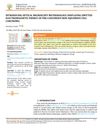
Search
for
Sort by
Research
360-390 / 1000+ results

research A Novel Surgical Approach to Nasolabial Fistula
The new surgery method successfully healed the patient's nasal wound without complications.

research Use of Ultra-Fast One-Step CK5 IHC for Identifying BCC and SCC During Mohs Surgery
A new one-step test can quickly identify skin cancer during surgery.

research STAT5 Activation in the Dermal Papilla Is Important for Hair Follicle Growth Phase Induction, Hair Follicle Regeneration, and Wound Healing
Activating STAT5 in the skin's dermal papilla is key for starting hair growth, regenerating hair follicles, and healing wounds.

research Diagnostic Criteria for Satoyoshi Syndrome
Both azathioprine and betamethasone treatments effectively regrow hair in alopecia areata, but azathioprine may be safer.

research Use of Oral Contraceptives in the Management of Acne
Birth control pills with low-dose estrogen and antiandrogenic progestins can effectively treat acne.

research A Case of Severe Hyperandrogenism, Acanthosis Nigricans, and Overt Diabetes: The Use of Non-Invasive Methods for Diagnosis, Pathogenesis, and Management
Non-invasive imaging helped diagnose a woman's severe hormone imbalance and diabetes, and medication successfully treated her condition.

research Hair Transplantation Between Identical Twins
Hair transplantation between identical twins can successfully treat severe, nonprogressive hair loss due to follicular aplasia.

research Jagged-1+ Skin Tregs Modulate the Innate Immune Response to Wound Healing
Jagged-1 in skin Tregs is crucial for timely wound healing by recruiting specific immune cells.

research Local Treatments for Alopecia Areata: An Update
Various local treatments for alopecia areata show promise, but individualized plans and more research are needed.

research Serum Irisin Level in Patients with Acne Vulgaris
Patients with acne vulgaris have lower serum irisin levels.

research Identification of Distinct Immune Signatures and Chemokine Networks in Scalp Inflammatory Diseases
Different immune responses cause hair loss in scalp diseases, with unique patterns in scalp psoriasis possibly protecting against hair loss.

research Data from Elevated Cutaneous Smad Activation Associates with Enhanced Skin Tumor Susceptibility in Organ Transplant Recipients
Higher TGF-β signaling may increase skin cancer risk in organ transplant recipients.

research Introducing Optical Microscopy Methodology Displaying Emitted Electromagnetic Energy of Pre-Cancerous Skin Squamous Cell Carcinoma
The new microscope method helps study energy from pre-cancerous skin cells.

research Coinfection of Secondary Syphilis, Condyloma Acuminata, and Human Immunodeficiency Virus (HIV) in a Homosexual Man
A 22-year-old homosexual man was diagnosed with secondary syphilis, genital warts, and HIV, highlighting the high STI risk in men who have sex with men.

research Case Report: Alopecia Areata and Cannabis Use
A girl with severe hair loss saw hair regrowth after using cannabis.

research Prevalence of Skin Diseases in Livestock in New Valley Governorate, Egypt
Over 30% of livestock in New Valley Governorate, Egypt, had skin diseases, affecting their productivity and income.

research Management of a Refractory EIF3E-RSPO2 Fusion Positive Pilomatrical Cancer Patient with Encyclopedic Tumor Analysis Guided Treatment
Personalized treatment based on detailed tumor analysis successfully managed and reduced the patient's aggressive hair follicle cancer.

research Erythematous Plaque on the Scalp With Alopecia
The woman has a scalp condition causing hair loss.

research Suspected Calcinosis Cutis and Demodicosis Secondary to Exogenous Steroid Administration in a Dog with Hypoadrenocorticism
A dog developed skin issues from too many steroids, but reducing steroids and using a specific treatment fixed the problems.

research Predictive Modeling of Patient Response to JAK/STAT Inhibitors and Dynamic Patient-Matching
Machine learning can predict how well patients with alopecia areata will respond to certain treatments.

research Novel Mechanism of UVB-Mediated Pigmentation Through the Axis of ATP-P2X7
Scientists discovered a new way UVB light increases skin pigmentation through the ATP-P2X7 pathway.

research Promotion of Hair Growth in Alopecia Areata by Topical Treatment of HDAC Inhibitors
HDAC inhibitors, like Vorinostat and Entinostat, can help regrow hair in alopecia areata.

research Acne Protection: Measures and Miseries
Acne can be managed with various treatments and requires psychological support due to its emotional impact.

research S-1 Induced Discoid Lupus Erythematosus-Like Lesions and Long-Term Complete Response for Para-Aortic Lymph Node Recurrence of Pancreatic Ductal Adenocarcinoma: A Case Report
S-1 treatment led to a complete response in pancreatic cancer with manageable side effects.

research Acne Vulgaris
The document says that early treatment of Acne Vulgaris is important to prevent scarring and that adult onset acne is common in women, often due to hormonal imbalances.

research A Novel Small Compound HPH-15 Antagonizes TGF-β/Smad Signaling and Ameliorates Experimental Skin Fibrosis
HPH-15, a new compound, effectively reduces skin fibrosis in experiments without causing harm.

research Down-Regulatory Role of Cholecystokinin on Psoriatic Epidermal Inflammation
Cholecystokinin may help reduce skin inflammation in psoriasis.

research Deep Phenotyping of Patients with Xeroderma Pigmentosum and Trichothiodystrophy
Deep phenotyping helps distinguish between xeroderma pigmentosum and trichothiodystrophy, aiding in diagnosis and treatment.

research The Role of Astrotactin2 in Regulating Mammalian Skin Polarity
Astrotactin2 affects hair follicle orientation and skin cell polarity.